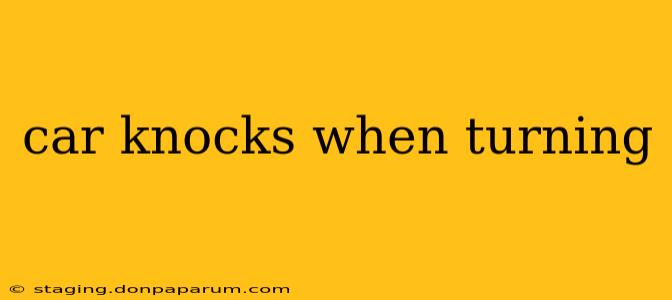A knocking sound when turning your car can be unnerving. It's a clear sign that something isn't right, but pinpointing the source can be tricky. This comprehensive guide will help you understand the potential causes of knocking noises when turning, empowering you to diagnose the problem and get your car back on the road safely and smoothly.
Common Causes of Knocking Sounds When Turning
Several components in your car could be responsible for that unsettling knock. Let's explore some of the most frequent culprits:
1. Worn-Out Suspension Components
This is often the primary suspect. The suspension system bears the brunt of impacts and keeps your tires firmly planted on the road. As it ages, various parts can wear down, leading to knocking:
- Ball Joints: These connect the control arms to the steering knuckles, allowing for smooth articulation. Worn ball joints exhibit a distinct knocking sound, especially when turning or going over bumps.
- Tie Rod Ends: Similar to ball joints, worn tie rod ends also cause knocking, particularly noticeable during sharp turns. They connect the steering rack to the wheels.
- Control Arm Bushings: These rubber bushings cushion the control arms, reducing vibrations and impacts. Deterioration leads to knocking and clunking sounds.
- Struts and Shocks: While not always the source of a knocking sound, worn struts and shocks can contribute to noises as they lose their ability to dampen impacts effectively. This might manifest as a thud or clunk rather than a sharp knock.
2. Issues with the Steering System
Problems within the steering system itself can also result in knocking sounds.
- Steering Rack: A worn or damaged steering rack can produce knocking sounds, especially under stress, like turning.
- Power Steering Pump or Fluid: Low power steering fluid or a failing power steering pump can lead to groaning, whining, or knocking sounds, particularly during turns.
3. Wheel Bearing Problems
Damaged wheel bearings can cause a variety of noises, including a knocking sound that's more prominent when turning. This is because turning puts added stress on the bearings. Listen carefully for a humming or rumbling sound in conjunction with the knock.
4. CV Joint Issues (Constant Velocity Joints)
CV joints transmit power from the transmission to the wheels, allowing for smooth turning. A worn or damaged CV joint often creates a clicking or popping sound, especially when turning, particularly at low speeds. This can sometimes be mistaken for a knock.
5. Brake System Problems
While less common, problems within the braking system can sometimes produce knocking sounds, particularly if there's an issue with a caliper or brake pads.
Diagnosing the Knock: Steps to Take
Before taking your car to a mechanic, try these steps:
- Listen Carefully: Note when the knocking occurs – at low speeds, high speeds, sharp turns, gentle turns, etc. The more detail you can provide, the better.
- Visual Inspection: Check for obvious damage or wear in the suspension components. Look for leaks in the power steering system.
- Test the Steering: Gently turn the steering wheel while the car is stationary. Listen for any unusual sounds.
- Check Tire Pressure: Incorrect tire pressure can contribute to unusual noises and impact the suspension.
When to See a Mechanic
If you're unable to pinpoint the source of the knocking sound, or if the sound is persistent and getting worse, it's crucial to consult a qualified mechanic. Ignoring the problem can lead to more extensive and costly repairs down the line. A professional mechanic will be able to accurately diagnose the issue and recommend the appropriate course of action.
This information is for guidance only and doesn't replace professional automotive advice. Always prioritize safety and seek professional help when needed.

